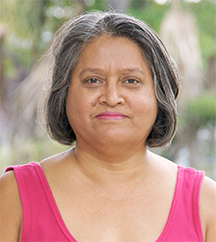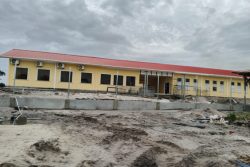The staging of the production Expressions 2 by GEMS Theatre Produc-tions directed by Gem Madhoo-Nascimento at the Theatre Guild Playhouse on November 9 drew attention to a number of factors arising from the current range of dramatic and poetic performance in Guyana at present. There is variety; a bit more than in the recent past, and there is variation also in quality, some of which is tied to the different types being performed. Much of this was evident in the range of items presented by Expressions 2.
This was the third production of Expressions for the year, in what seems to be a continuing series. It is primarily a ‘poetry’ production; it started off originally as the staging of poetry readings, but very quickly it transcended readings and graduated to the performance of poetry. As it was in the beginning, persons presented and read selections of poems that interested them, showcasing some of the established Guyanese poetry as well as some poetic and dramatic extracts from the classics of world literature, including Shakespeare. But the theatrical setting of this prompted the programme to become more of staged readings developing to the point where by the second and third editions there was almost a universal effort to perform the pieces.
It is largely because of this that the production turned out to be a useful reflection of the range and variety of forms and types being performed in Guyana. And also relevant to this is the way the production has excited the interest of several new writers and performers representing youth and the newly developed/developing forms in which they are now involved.

Important to the aims of this series of productions was exposing the secondary schools population to poetry and literature. However, this attempt has not taken off. For whatever reason, Expressions has not so far succeeded in drawing out the schools which have not responded in any number. One theory is that schools see it as problematic bringing their students out to a night performance. But matinees planned specifically for schools had to be cancelled because of the lack of response. On the other hand it was noted that at least one secondary school was visibly in attendance. Very significantly, the teacher who brought them is a lecturer at the National School of Theatre Arts and Drama (NSTAD) who has also introduced the school to the CXC drama programmes.
Expressions, then, has come to be dramatic performance with poetry at its core. There were short excerpts from Shakespeare’s drama which led the selections from the classics of the world. These have so far been loosely staged dramatic monologues, interpreting such famous pieces as those by Shylock in The Merchant of Venice, Prospero in The Tempest and Marc Anthony in Julius Caesar. Then there were selections for the leading and established Guyanese poets, and there was a very informative range here. One could learn about the important corners of Guyanese poetry from the selections.
It started in the past with selections from CEJ Ramcharitar Lalla, a piece that gave a sample of the rise of early Guyanese poetry treating the East Indian poetry of the time (early 20th century) as contrasted with later verse. Selections from the Coolie Odyssey of contemporary poet David Dabydeen took the Indian verse further up in time and history, showing the different setting and emphases of the more modern poetry treating Guyanese Indians of decades later and including the theme of migration. The twentieth century poetry was further represented by presentations of Martin Carter, Ian McDonald, Robert Fernandes and Mahadai Das.
Other dimensions in the poetry presented also demonstrated different types of poetry and in particular, the current emphasis in performance. This was seen in the treatment of a poem by seventeenth century English poet William Blake, ‘The Poison Tree.’ It was a post-modernist interpretation in more ways than one, including something far from the normally accepted version of its meaning. This was a most interesting dramatised reading, with acting and choreography. The style of performance reflects another element in the performance on contemporary Guyanese stage in the twenty-first century.
There are now more examples of creative performance techniques on the stage than in the very recent years when the trend was thrillers and comedy. The Guyanese theatre had resigned itself to the reality that experimentation and the avante-garde would not sell tickets and confined itself to realism. This movement was accompanied by the rise of social realism in the theatre which challenged the comic dominance. But now there is evidence of theatre whose writers and directors are more interested in pushing back the frontiers a bit and are not afraid to deviate from the popular.
One might repeat that in spite of its newness, the National School of Theatre Arts and Drama is having an influence on this. The evidence is that this version of ‘The Poison Tree’ in Expressions 2 was done by graduates of the Drama School. The readings of Mahadai Das’ ‘Fragment of Poem’ and ‘Murdered’ also had interpretations which saw them accompanied by dance, concepts and performances by another graduate of NSTAD. Further to those were two performance pieces by present students of the NSTAD whose form was ritualistic theatre bordering on the experimental. Those were the evidence of this influence seen in Expressions but it only reinforced what had been seen in other productions where Drama School students and graduates were involved.
The performance elements in the presentation of poetry on stage at the present time were further exhibited by the new work written by Guyanese poets on the rise. Most of that work reflects the current advance and growing popularity of what is now called ‘Spoken Word’ performance. There is less concern with literary craft and it is much more about speaking to an audience. The writing therefore focuses on messages and popular type fashionable phraseology. The best of them put in elements of orality and rhythm in the composition. Spoken Word is the development from ‘slam’ poetry with the same direct reach to a live audience.
Many of the newer writers have gone that route and poetry slams had become quite popular in Guyana recently coming out of sessions at the Upscale Restaurant. Several of the composers and performers in that genre emerged from there. Now they have opportunities for appearances on the mainstream stages.
The Expressions series has opened another opportunity for these writers and performers, as one of the few poetry productions. Others in the production wrote performance poetry different from the slam, such as dramatisations and commentary on cricket, introducing humour into the performance type.
The other value of the production was the chance it gave many of the established actors and actresses to perform short individual pieces. Alongside them were those not normally active as theatre performers but who have an amateur interest to read or recite poetry that interests them. This helps to keep an audience for the theatre alive and to sustain their interest. These are the ones most likely to support theatre that is not comic or popular.
Madhoo-Nascimento’s theatre innovations, then, continue. She has stepped up the pace and diversified it in recent years with new ideas such as this. She has created exposure and opportunities in management, performance, entrepreneurship and in a persistent reaching out to the secondary schools.








